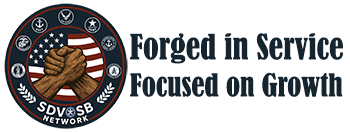Running a Service-Disabled Veteran-Owned Small Business (SDVOSB) comes with unique opportunities to grow through government programs, contracts, and support networks. Below is a comprehensive breakdown of the most important federal and national resources available for SDVOSBs, including what each one does, how it can help, and a list of pros and cons for better decision-making.
Services Provided:
Pros:
Services Provided:
Pros:
Services Provided:
Pros:
Services Provided:
Pros:
Services Provided:
Pros:
Services Provided:
Pros:
Services Provided:
Pros:
Current Status: Redirects to SBA for SDVOSB certification and verification.
How It Helps: None directly now; historical reference only.
Pros: N/A
Cons: Replaced with a more streamlined system
Services Provided:
Pros:
Services Provided:
Pros:
Services Provided:
Pros:
Maximizing these resources ensures you get the support, certifications, and mentorship necessary to win contracts, scale your operations, and make an impact as a Service-Disabled Veteran-Owned Small Business.
U.S. Small Business Administration (SBA) - Office of Veterans Business Development (OVBD)
Purpose: The SBA OVBD advocates for veteran entrepreneurs, offering guidance, funding access, and policy support.Services Provided:
- Grants and loan programs
- Business counseling and mentorship
- Access to federal contracting programs
- Veteran Business Outreach Centers (VBOCs)
Pros:
- Nationwide support infrastructure
- Specialized programs like Boots to Business
- VBOCs provide localized assistance
- Limited direct funding (mostly loan-based support)
- High competition for SBA loans and grants
APEX Accelerators (formerly PTACs)
Purpose: Provide one-on-one support to small businesses looking to navigate government procurement.Services Provided:
- Registration assistance (SAM.gov, DSBS)
- Bid matching and research
- Proposal review and compliance checks
- Training and workshops
Pros:
- Free expert consulting
- Strong local networks
- Direct assistance with contracts and bids
- Availability and expertise vary by location
- Limited staffing in some areas
VA OSDBU - Department of Veterans Affairs Office of Small and Disadvantaged Business Utilization
Purpose: Promote and support veteran participation in VA procurement programs.Services Provided:
- Access to the Veterans First Contracting Program
- Verification through the VA's Center for Verification and Evaluation (CVE)
- Resources for navigating VA contracting
Pros:
- Exclusive contracting opportunities with the VA
- Helpful for firms already in healthcare or logistics
- Verification adds credibility
- Verification process can be slow and complex
- Limited to VA-specific contracts
SAM.gov - System for Award Management
Purpose: Central registration platform for businesses seeking federal contracts.Services Provided:
- Entity registration
- Contract opportunity search
- Exclusion and certification repository
Pros:
- Centralized portal for all federal contracts
- Free to register
- Ties into other platforms like FPDS and eSRS
- Not intuitive for new users
- Technical issues and complexity can delay progress
VetCert Program (via SBA)
Purpose: Replaces the VA CVE process, providing SDVOSB/VOSB verification for government contracting.Services Provided:
- SBA reviews and approves SDVOSB status for federal contracting
- Required for set-aside and sole-source contract eligibility
Pros:
- Streamlined under SBA
- Single verification for use across agencies
- Must renew periodically
- Any inaccuracies can delay approval
GSA (General Services Administration) Schedules
Purpose: Offers SDVOSBs a chance to sell directly to government buyers through pre-negotiated pricing schedules.Services Provided:
- Contract vehicle inclusion
- Vendor outreach and onboarding
- Marketing support through GSA Advantage
Pros:
- Trusted by government buyers
- Reduces procurement friction
- Opens long-term revenue stream
- Complex application process
- Requires compliance and pricing audits
SBA 8(a) Business Development Program
Purpose: Designed to help socially and economically disadvantaged businesses, including SDVOSBs that qualify.Services Provided:
- Nine-year support program
- Access to sole-source contracts
- Business training and mentorship
Pros:
- Powerful tool for growth
- Provides direct access to lucrative contracts
- Must meet strict economic disadvantage criteria
- Limited to nine years
VETBiz Portal (Discontinued and Moved to SBA)
Purpose: Originally a hub for VA-related business verification, now replaced by SBA’s VetCert.Current Status: Redirects to SBA for SDVOSB certification and verification.
How It Helps: None directly now; historical reference only.
Pros: N/A
Cons: Replaced with a more streamlined system
SCORE - Veteran Mentorship Programs
Purpose: Offers free business mentoring and guidance from experienced entrepreneurs and executives.Services Provided:
- One-on-one mentoring
- Webinars and workshops
- Business plan assistance
Pros:
- 100% free
- Deep bench of experienced mentors
- Online and in-person support
- Mentor availability varies
- May not have government contracting expertise
Boots to Business (B2B) Program
Purpose: An entrepreneurship training program for transitioning service members and veterans.Services Provided:
- Introductory and follow-on courses
- Business feasibility analysis
- Pathways to capital and mentorship
Pros:
- Government-backed credibility
- Tailored to transitioning service members
- Strong starting point for new SDVOSBs
- Focused on new entrepreneurs
- Less support for existing or mature businesses
American Legion and VFW Business Advocacy Units
Purpose: Advocate for veteran-owned businesses and offer support for navigating government and commercial sectors.Services Provided:
- Policy advocacy
- Local business promotion
- Member-to-member networking
Pros:
- Veteran-focused representation
- Event and pitch opportunities
- Varies by chapter
- Less formalized business training
Summary: Choosing the Best Resource
Choosing the right resource depends on your SDVOSB’s stage, goals, and capacity. Here's a quick-use guide:| Program | Best For | Focus |
|---|---|---|
| SBA OVBD | General support | Education & access to capital |
| APEX Accelerators | Contract readiness | Proposal assistance |
| VA OSDBU | VA contracting | VA-only opportunities |
| SAM.gov | All SDVOSBs | Contract registration |
| VetCert | Verified status | SDVOSB eligibility |
| GSA Schedules | Product/service businesses | Selling to gov't buyers |
| SBA 8(a) | Disadvantaged SDVOSBs | Long-term growth |
| SCORE | One-on-one help | Mentorship |
| Boots to Business | New SDVOSBs | Startup guidance |
| Legion/VFW | Local support | Advocacy & networking |
Maximizing these resources ensures you get the support, certifications, and mentorship necessary to win contracts, scale your operations, and make an impact as a Service-Disabled Veteran-Owned Small Business.
